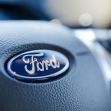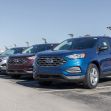Ford Motor Company advertises its trucks with the motto “Built Ford Tough.” But the company might not be as tough as its motto claims. The death of an elderly Georgia couple who died when the roof of their Ford Super-Duty pickup collapsed after their truck blew a tire and flipped over, resulted in a $1.7 billion jury award for the couple’s two children in 2022. And additional lawsuits will further question whether Ford’s trucks are tough enough to protect their occupants.
The deaths of Melvin and Voncile Hill in 2014 and the mega-jury verdict in Georgia perhaps inspired a group of pickup owners in Michigan to file a class lawsuit against Ford. Even though they have not been injured, a group of plaintiffs is seeking damages from the Michigan company. They claim that Ford has not taken steps to prevent deaths or serious injuries from roof collapses that Ford knew about but continued to ignore. Instead, Ford used inferior roof products to save the company money, the complaint alleges. Ford is currently asking for a new trial and appealing the Georgia decision.
Ford manufactured over 5.2 million of its pickups from 1998 to 2009. The class action complaint filed against the company in September 2022 alleges that the trucks contained design defects that cause their roofs to be crushed if the trucks roll over. The complaint calls it the “Roof-Crush Defect” and reports that it was the cause of the death or injury of not only the Hills but many others. Similar incidents have already prompted 162 lawsuits from 83 events similar to that suffered by the Georgia couple.
Even more disturbing, the complaint alleges that there is evidence to show that Ford’s own investigation of Roof-Crush-Defect accidents revealed the danger. But Ford kept making and selling the dangerous vehicles while it settled lawsuits that all had secrecy clauses that hid the dangers from the public.
And the dangers are very serious. When a rollover occurs, the “survival space” for occupants is severely reduced or eliminated, making their heads and spines hit the roof. Also, when the truck roof collapses it can cause windows and windshield to break, possibly ejecting the driver and passengers.
The primary plaintiff in the class action suit is Steven Beck, a California resident, but the complaint was filed in U.S. District Court for the Eastern District of Michigan under diversity jurisdiction because Michigan is Ford’s primary location. Other plaintiffs reside in other states such as Washington, Oregon and Kentucky. The suit claims that Ford breached its warranties by not repairing and replacing defective parts according to various state civil codes.
The class action suit relies on the ruling in Ott v. Ford Motor Company to support its case. Ott claimed that “Ford significantly reduced the thickness of the metal” it used when developing its pickup and “removed at least one major reinforcement.” It said that Ford continued to thin its metal after the first model of the F-150 was put on sale in 1998. The suit claimed that these changes “compromised roof strength” according to third-party tests conducted in 2003. The Ott case also disclosed that Ford had designed a stronger roof in 2004 but did not install it until 2017.
The class action suit is currently pending before District Judge F. Kay Behm of the Eastern District of Michigan. The last event in the case’s docket report was a video conference hearing regarding a motion for a more definite statement.
The Wall Street Journal reported that neither the Hill nor the Beck lawsuits are unique. Ford has been sued at least 58 other times for cases involving roof-crash defects over a 17-year period while insisting that its vehicles are safe. The newspaper said that Ford settled 43 of the 58 lawsuits, “but the details are unknown or confidential.” Ford reportedly won just four of the suits.
After the Hill verdict, Ford would not comment on the case but did say that the company’s “sympathies go out to the Hill family.” A company representative said they don’t believe the verdict is supported by the evidence, and he plans to appeal. He also said that Ford was “not going to litigate this matter through the news media.”
Ford Motor Company reported losses of two billion dollars for 2022, primarily because of disappointing investments in an electric truck company and an autonomous car business. The Georgia verdict certainly won’t help, and the effect of the class action suit remains a concern.
Even if Ford isn’t litigating in the news media, the news media will be watching and informing the public.






